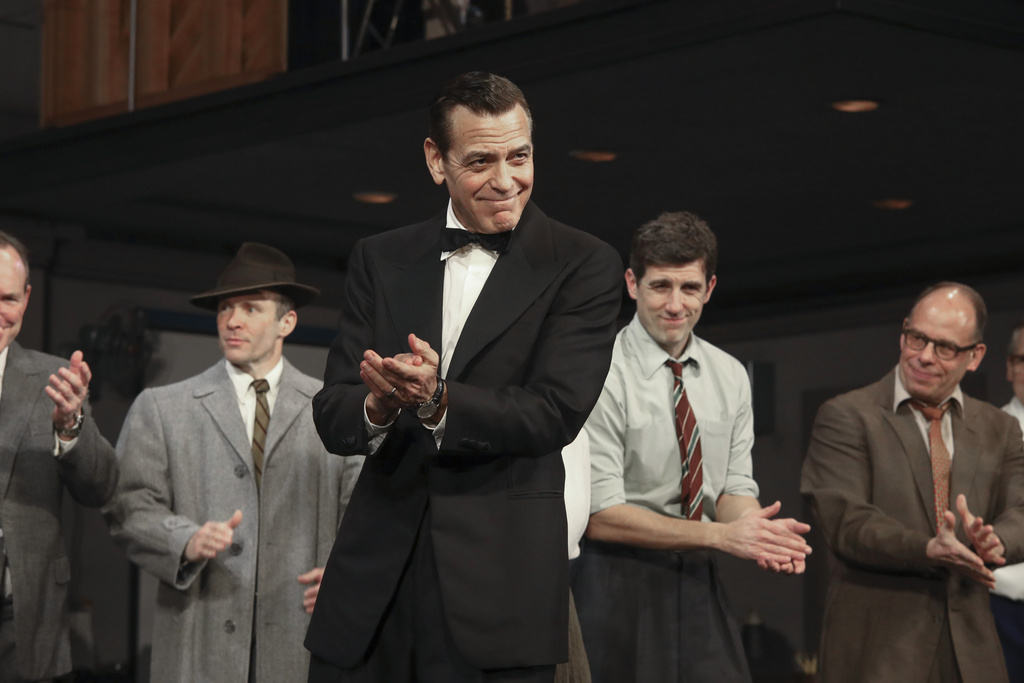CNN’s Out of Touch And Self-Important George Clooney Broadcast Is Exactly Why the Network Is Struggling

(Photo by Andy Kropa/Invision/AP, File)
CNN is doing something innovative and outside the box of traditional cable news programming: They will be broadcasting the five-time Tony-award-winning play Good Night, and Good Luck, starring George Clooney, live from the Winter Garden Theater this coming Saturday.
Given the nonstop promotion on the network and the bizarre live broadcast starting at 6:30 p.m. co-hosted by Anderson Cooper and Pamela Brown, they are using every part of the promotional cow when it comes to this stunt. Their objective seems clear: signal the virtue of a journalistic legend in the hopes that it reminds viewers that their news organization is more journalistically sound than their competitors, which, in fairness, is largely accurate.
That said, the massive promotion is so nakedly out-of-touch and anachronistic that it’s become not just annoying for CNN viewers, but a stark reminder of precisely why the network is struggling with record-low ratings.
Good Night, and Good Luck — a play based on a 2005 film with the same name starring David Strathairn with the same name — tells the story of broadcast news legend Edward R. Murrow, “showcasing his legendary, history-altering, on-air showdown with Senator Joseph McCarthy,” a CNN press release blares. “As McCarthyism casts a shadow over America, Murrow and his news team choose to confront the growing tide of paranoia and propaganda, even if it means turning the federal government and a worried nation against them.”
By any objective measure, it is both a fascinating play (and movie) that takes a close look at one of the most journalistically pure times in US history. And it’s easy to see some clear parallels between the McCarthyism of the 50s and the subjective information wars, irresponsible conspiracies, and gaslighting smears of the current day.
Murrow is a deserved legend for many good reasons. However, his commitment to sharing hard facts and truth, without fear or favor, came at a much simpler time in American media history. There were only three television broadcast networks, and most people relied on newspapers, radio, or film reels for their news and information. Much of the “news” was therefore less immediate than it is today, and the U.S. population was not only more homogeneous in thought but also benefited from shared experiences of consuming a handful of outlets.
However, that’s not the primary reason this play is best viewed as a period piece, rather than a totem for how we should be reporting and consuming news information today. Good Night, and Good Luck comes from a pre-psychological era, before post-modern philosophers deconstructed meaning and leaned into “semiotics.” Some 60 years later, it’s that very ephemeral nature of meaning that has led to the toxic cesspool of “analysis” or extremist opinions, which are packaged and delivered as though they are “news.”
This is not just opinion-based cable news programs that appeal to extreme ends on both sides of the aisle on MSNBC and Fox News. Take a look at the most popular political podcasts, Substacks, or social media feeds. They aren’t successful because they are fact-based. They exist to prove a subjective and partisan point. They are not news. But they rate. And they’re lucrative for networks, which is why they persist. Outraged opinions sell a lot of soap (or whatever pharmaceutical product, like Skyrizi, that enjoys an unlimited marketing budget).
As much as CNN might want to celebrate Murrow, he’d never last more than a few months on their air — if he were alive today — because his style of journalism would attract hardly any viewers on cable news. And that’s not a criticism of him, that’s a criticism of us, the viewers, who seem unable to resist the anger-inducing programming that so effectively stimulates our collective amygdala, which keeps us tuning in for more.
I get why CNN wants to connect its brand with a legend of journalism. However, the shameless promotion of a theatrical performance celebrating a historical and outdated legend seems only to draw attention to how far we’ve come and how different the network is from its intended DNA.
It’s no secret that CNN’s ratings have been in a steady decline since January 2021, when the network benefited from major news events, including the January 6th insurrection and a second Trump impeachment, to become the top-rated cable news network. Just over four years later, it finds itself in a distant third place.
One ratings bright spot, however, is NewsNight, hosted by the talented Abby Phillip. It’s successful because it’s a panel show featuring diverse political viewpoints, which often leads to a range of spirited discussions and occasionally, unhinged fights. In the context of current cable news fare, it’s good television, which is why it’s ostensibly the network’s hottest show.
It’s also the kind of show that Murrow wouldn’t be caught dead hosting — and we need look no further than Good Night, and Good Luck itself for proof. The play depicts Murrow holding his nose while hosting the show Person to Person, which featured puffy celebrity interviews with all the biggest stars of the day. (People like, say, George Clooney.) Murrow hated the type of celebrity glorification that Person to Person was all about, and he only did the show because his bosses demanded it in exchange for his ability also to host the more costly See It Now, which featured the more serious journalism Murrow preferred.
Despite Clooney’s best intentions, Murrow surely would have likely detested Saturday night’s presentation of Good Night, and Good Luck on CNN. The network is glorifying a partisan (read: divisive) Hollywood titan — building him up as a high-and-mighty Murrow-esque crusader for truth. That CNN is aligning itself with Clooney — arguably the single most prominent avatar of the coastal elite in all of American life — shows just how disconnected they are themselves, how distant they are from their audience.
And if Murrow was about anything, he was about connecting with his audience — talking to them, not at them. And he was about listening to them as well. For five years in the 1950s, he hosted a radio show called This I Believe, which gave ordinary Americans a chance to deliver their opinions on air in five-minute essays. That’s how he knew what Americans wanted and needed in a news broadcast, and that’s how he became a beloved American icon.
The whole endeavor feels like a pseudo-intellectual effort to portray oneself as one wants to be seen, instead of just doing the thing. Reminds me of the guys who purchase a David Foster Wallace novel, not to read, but to decorate their nightstand.
Max Von Sydow’s character famously said, in Hannah and Her Sisters, “If Jesus came back and saw what was being done in his name, he’d never stop throwing up.” It pains me to say this, but if Murrow were to come back and see CNN right now packaged as a “news,” he would also never stop throwing up. And he’d surely never want to be associated with it.
This is an opinion piece. The views expressed in this article are those of just the author.





Comments
↓ Scroll down for comments ↓